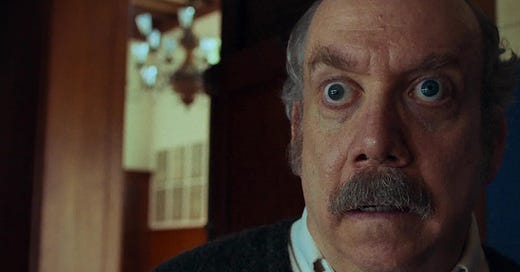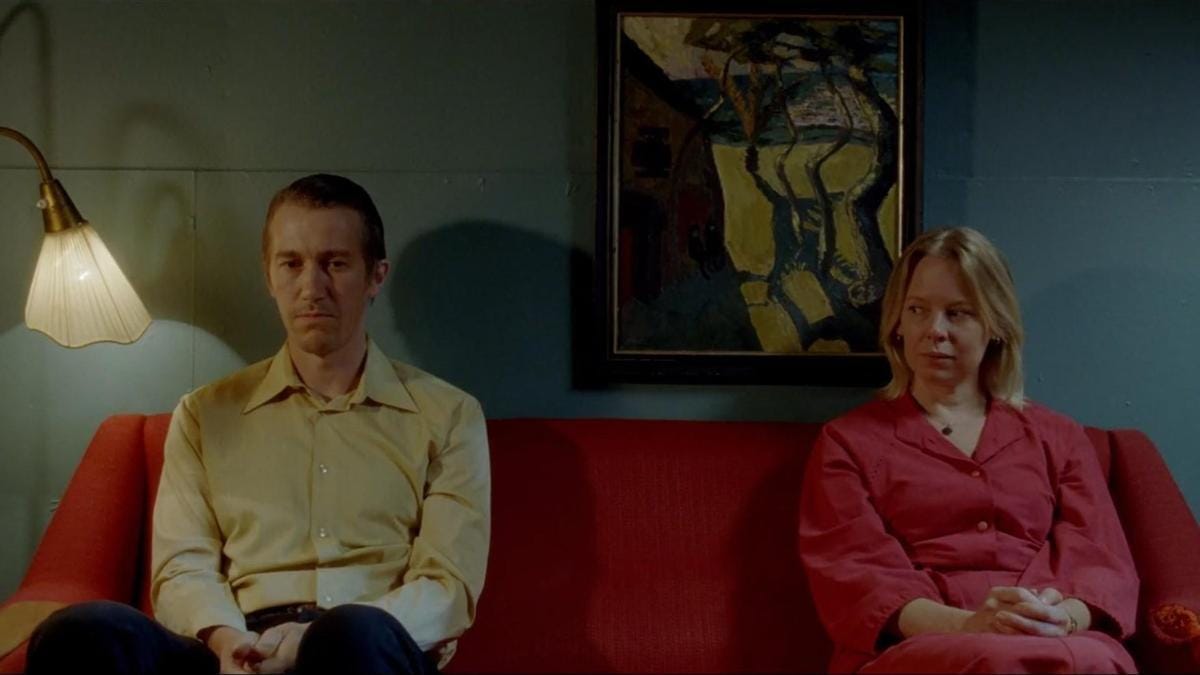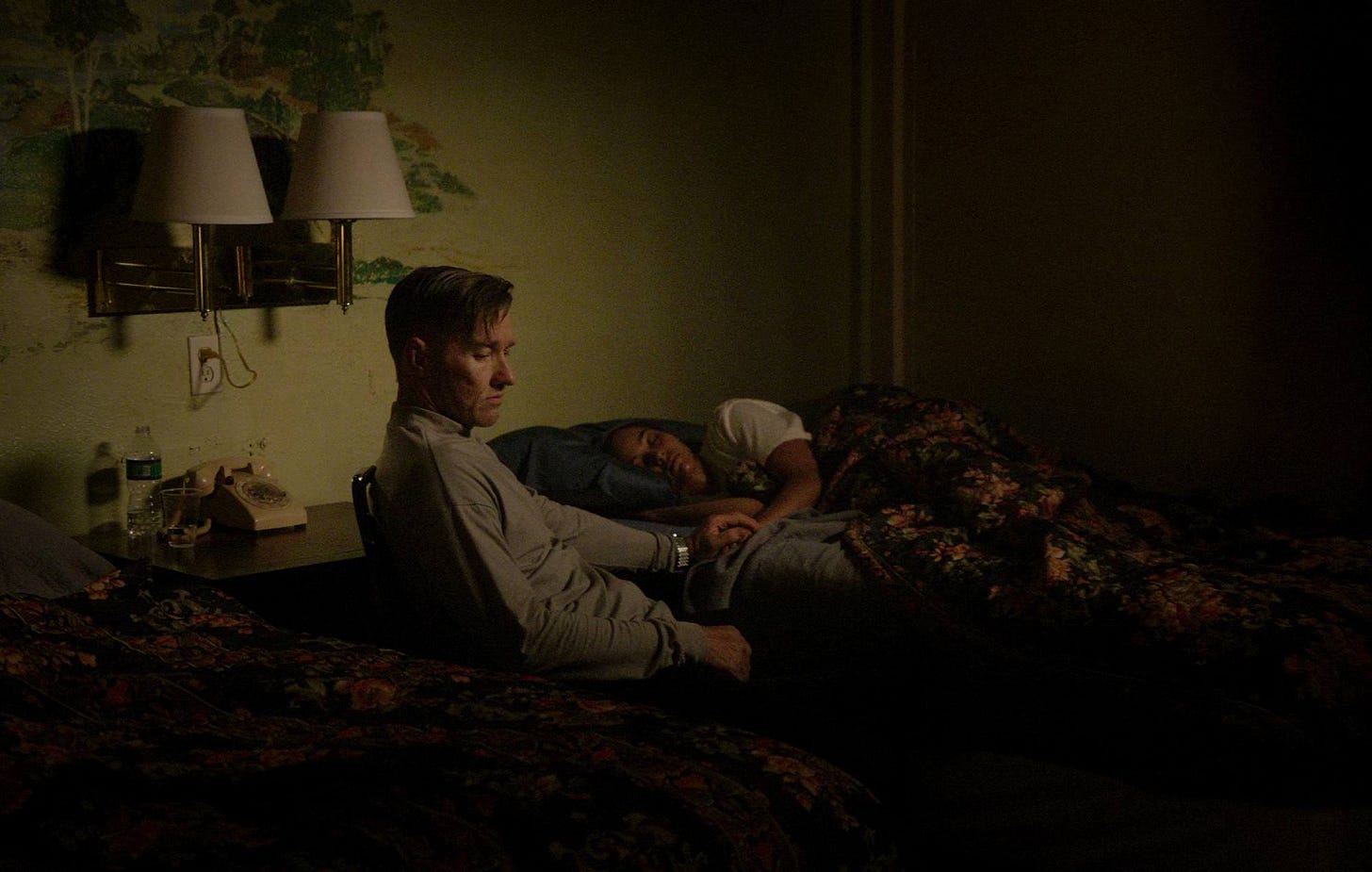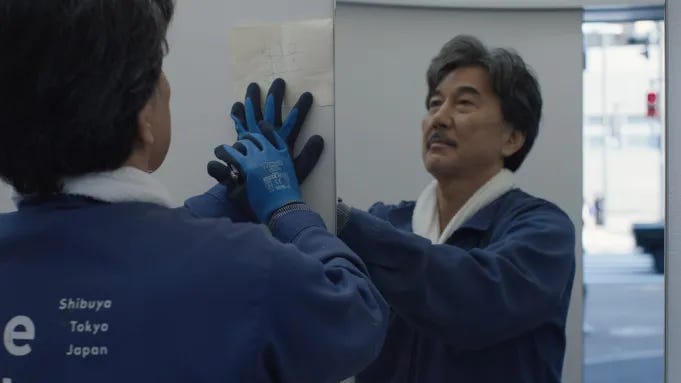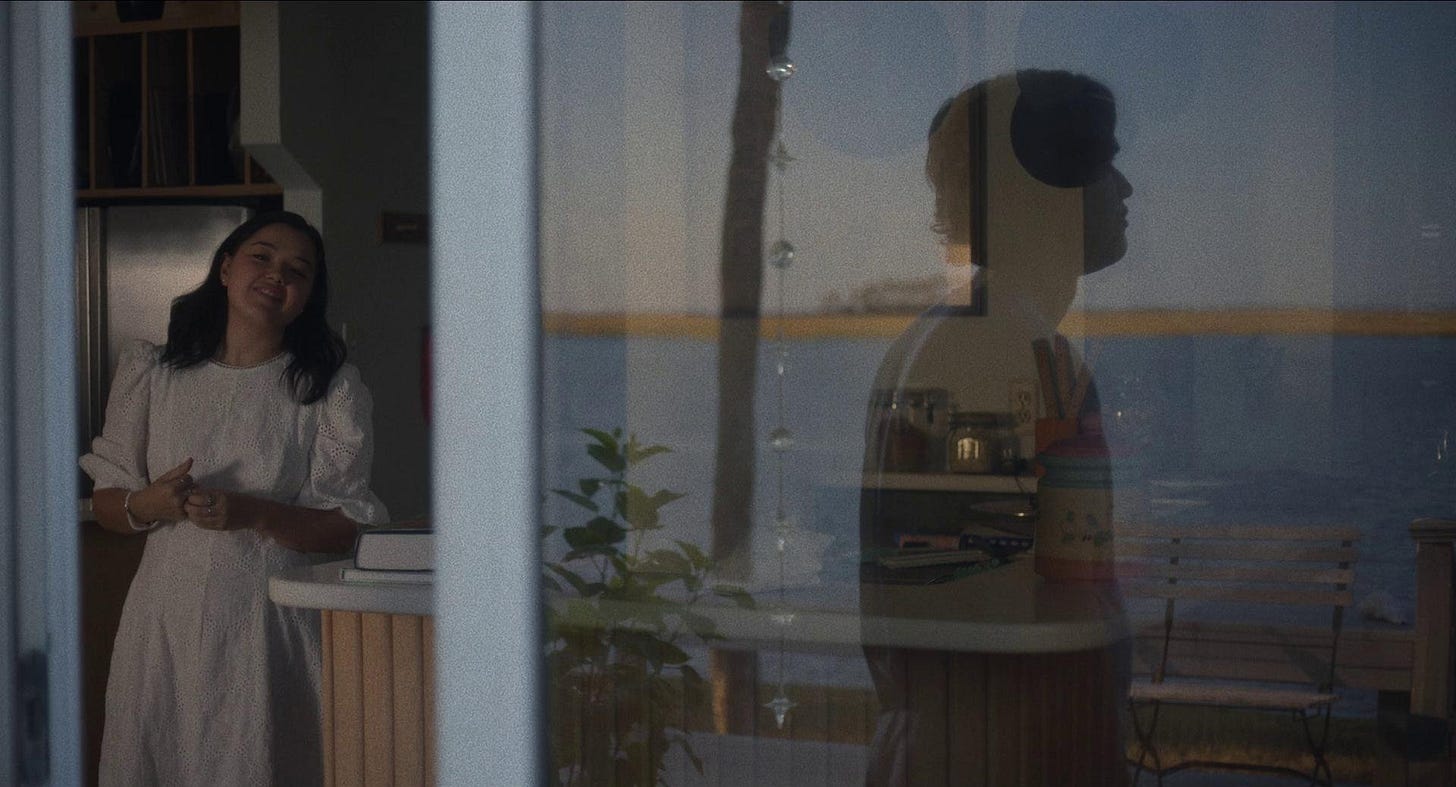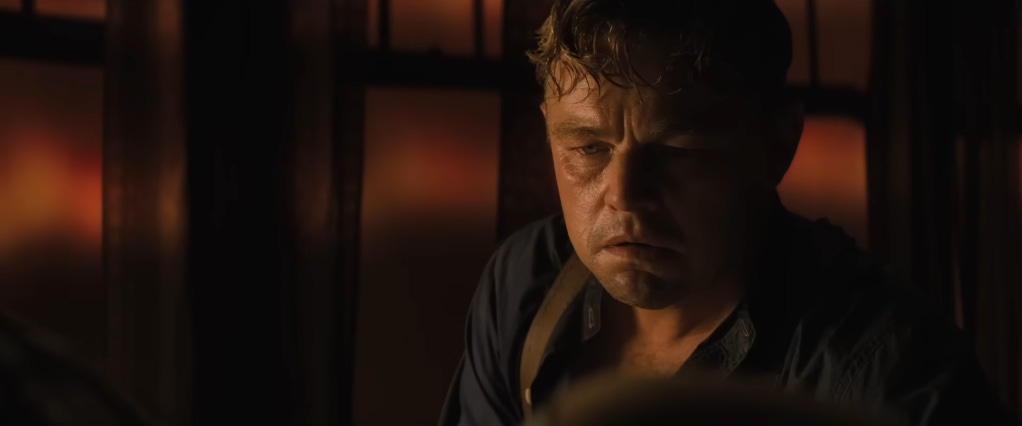The Holdovers (Alexander Payne)
I like simple pleasures like butter in my ass, lollipops in my mouth. That’s just me. That’s just something that I enjoy. Call me crazy, call me a pervert. Give me a movie with Paul Giamatti playing a middle aged curmudgeon and I’m happy. This movie made me happy.
Afire (Christian Petzold)
This is a movie about a “writer” who never writes, instead spending his time being a condescending mopey drag. I’m not sure how Christian Petzold got the movie rights to my life story, but I’m glad he made a movie this good about it.
Fallen Leaves (Aki Kaurismäki)
Two poor Finnish people meet cute and take the tentative steps towards building a relationship. This is the first movie by Aki Kaurismäki I’ve seen, and he expertly blends social commentary (it apparently sucks to be poor in Finland, who knew) with an easy going dry humor. There’s a scene where the couple goes to the movies and the movie they go see, within the context of this movie, is maybe the funniest gag of the year. Alma Pöysti gives a tenacious, world weary performance as a woman who tries to navigate a new relationship with a flawed man while also enduring the circumstantial indignities that come with doing low wage work. Good movie.
Anatomy of a Fall (Justine Triet)
A woman, apparently of some prominence, is being interviewed in the basement of her house. Upstairs, her annoyed and/or inconsiderate husband, repeatedly blasts a steel drum instrumental version of 50 Cent’s “P.I.M.P.” (I don’t know who came up with the song choice, but they are a genius.) Some time later, the husband falls to his death. Did he accidentally fall? Was it suicide? Or was he pushed out? Anatomy of a Fall becomes a French courtroom drama (if the depiction of French court in this movie is in any way accurate, wow what a legal system) about the subjective nature of reality. And not to give away the ending, but it’s also a great movie to watch if you’re thinking about ways to kill your spouse and get away with it. Or maybe it’s a terrifying movie about being wrongfully accused of your beloved husband’s tragic death. Either way, you know. Don’t get married.
Master Gardener (Paul Schrader)
“I used to be an artist who never wanted to leave this world without saying, ‘Fuck you.’ And now I’m an artist who never wants to leave this world without saying, ‘I love you.’” -Paul Schrader, 2023 Venice Film Festival
The third film in Uncle Paul Schrader’s informal Man in a Room trilogy (along with First Reformed and The Card Counter), Master Gardener is the weakest installment of the three. Nonetheless! The fact that it’s one of my favorite films of the year is a testament to the potency of the trilogy’s themes and the power of Schrader’s late style. And boy, is this movie a monument to late style. Schrader may have made this movie for $40, eschewing any dynamic style for simplistic, straightforward compositions that rely on the strengths of the performances and his script to do the heavy work. (Sigourney Weaver’s work here as a deeply insecure, unstable planation owner has been unjustifiably forgotten in the “awards conversation.”) It works for me. The first shot of Joel Edgerton sitting alone in a room writing in a diary had me hooting and hollering. I can understand why Schrader’s use of the same narrative devices (always the Pickpocket touchstones) might be too well worn to be interesting for some audiences. But to me his dedication to making the same movie over and over again, and even knowingly leaning in to his own shtick, is endearingly earnest and eternally engaging. Every artist only ever has one subject, anyway. I found the movie’s contemplation of the nature of forgiveness, the ability for people to change, and the way broken people can heal each other to be deeply affecting. Paul Schrader is one of the world’s greatest living filmmakers. (And his appearance on The Adam Friedland Show was spectacular.)
“I included a frontpiece quote on my first script, Taxi Driver, from Thomas Wolfe, ‘The whole conviction of my life rests upon the belief that loneliness, far from being a rare and curious phenomenon, peculiar to myself and to a few solitary men, is the central and inevitable fact of human existence.’ I’ve attached a frontpiece quote to my last script, Master Gardener, from Leonard Cohen, ‘And I choose the rooms that I live in with care, The windows are small and the walls almost bare, There’s only one bed and there’s only one prayer, I listen all night for your step on the stair.’” Twixt the two is the arc of hope that living can bring.”
-Paul Schrader, March 4, 2023; Facebook
Perfect Days (Wim Wenders)
A spiritual twin to Jim Jarmusch’s 2016 masterpiece Paterson, Perfect Days is about a middle aged Japanese man who works as a cleaner of public restrooms. He takes his job seriously and does it well. (By the way, if this movie is any indication, public bathrooms in Tokyo are the height of luxury.) When not working, he likes to spend his time reading, listening to music in his car, eating lunch in the park, and having a beer at the same bar every day after work. Just a guy being a dude. Perfect Days is a movie about finding joy in the everyday minutiae of life, about doing your job well no matter what it is, how cool it is to go to a bar where everybody knows your name, and how much it rocks to listen to some good tunes. This is a life. What an aspirational thing.
Asteroid City (Wes Anderson)
The meaning comes from the doing. The pleasure comes from the watching. Wes Anderson remains in rarefied air. Fuck the haters.
May December (Todd Haynes)
May December is many things at once: A satire about the ridiculousness of actors and their “processes”; a commentary on the impossibility of art to ever achieve “the truth” in its depiction of real people; a meta comedy/soap opera about a married couple with a sordid, tabloid past; a tragedy about a man who has never come to terms with the exploitation that is the core fact of his life. Under the direction of Todd Haynes, these disparate elements cohere into one picture of a married couple, their family, and the actress who observes them in preparation for an upcoming movie project. It is a funny, strange, heartbreaking and deeply unsettling movie.
The Zone of Interest (Jonathan Glazer)
Speaking of deeply unsettling. The Zone of Interest is about a man with a job, wife, and a bunch of kids. He’s got a pool in his backyard. One of his children has a birthday, so he hosts a party. A bunch of children come. His mother-in-law comes. Everyone has a good time, though his mother-in-law’s visit is cut unexpectedly short. At work, his bosses want to transfer him to a new branch which would require the relocation of his family. His wife bristles at this and pesters him to find a way to prevent his transfer. In other words, he’s a normal guy living a normal life with the normal domestic stresses that come with being alive. Oh yeah, there’s another thing: He’s Rudolf Höss, the commandant of Auschwitz, his job is to kill millions of people, and he’s really good at it. In fact, that smoke in the background in the above picture, above the family greenhouse, is the smoke from a steam engine carrying another train load of victims to be killed in Rudolf’s death factory. Luckily, the train’s arrival doesn’t seem to be disturbing the children’s fun. Thank God for small favors. Killing so many people in such a short period of time is a bit of a logistics problem, but luckily Rudolf likes solving logistics problems, just as he secretly likes raping camp prisoners in the basement of his house as his wife sleeps upstairs (do you think she remembered to hang the fur coat she stole from the possessions of a murdered camp attendee back up in the closet before falling asleep?). Annoyingly, Rudolf has to spend some time in Berlin and attend a party for Party members celebrating everything he has achieved so far. Not his type of thing, as anyone who knows him knows, but he’s gotta go, make an appearance, it’s for him after all, if you’re going to kill all those people you might as well celebrate it with a glass of champagne, you know? But for some reason he doesn’t feel well and as he’s leaving the party he keeps on retching and retching in the stairwell, but the dry heaving doesn’t bring anything up, just the sensations of nausea without of any of its contents. Just emptiness where his guts should be.
Killers of the Flower Moon (Martin Scorsese)
The plantation outside of his home is burning, part of an insurance fraud scheme his Uncle William Hale (Robert De Niro) has cooked up, another way for Hale to exploit being the beneficiary of a racist system for the accumulation of more (and more) money. Ernest Burkhart (Leonard DiCaprio) stares at the wife (Molly, played by Lily Gladstone) he has slowly been poisoning to death as she passes out in pain. As the legendary blues song “Dark Was the Night, Cold Was the Ground,” plays on the soundtrack, Ernest’s unacknowledged buried conscience briefly takes control of his body. He ingests a sample of the poison he has been “medicating” his wife with, eventually passing out on the bed next to her. Is it an act of self-punishment? Solidarity with his wife against his own malevolence? An attempt to grapple with his own evil nature? It is the only time Ernest acknowledges in any way that he’s murdering his wife. Even at the end of the movie, when his wife opens the door one last time to a possible chance at redemption, Ernest chooses to maintain the lie that he must tell himself in order to maintain his self-image. To admit the truth about himself- especially to himself- would be unbearable. Continuing to live an evil, easy lie is easier than the hard work of contrition, soul be damned.
Scorsese’s last two movies- The Irishman and Killers of the Flower Moon- have centered two dumb white men who choose loyalty to Satan (in the figure of benevolent paternal figures) over decency and love. They do so because they are too dumb to see who their father figures really are, too cowardly to question the morality of their marching orders, too lazy to stand against the inertia of the evil machine they volunteered to be cogs in. They embrace self-deception and a lack of introspection as survival skills. They are emblematic of America itself, too dumb to see that what it’s doing is wrong and too boorish to even contemplate the question. At the very end, Scorsese turns the implications of his movie on himself, offering a self-critique about the nature of his work and himself with a brilliantly weird, bold, and unexpected finale. Here, the similarity isn’t to The Irishman but to the ending of The Wolf of Wall Street: we’re all complicit in this evil. So what are we going to do about it?
Brief Oscar thoughts:
Best Supporting Actress
Should Win: Lily Gladstone (Killers of the Flower Moon)
Of Those Nominated: Da’Vine Joy Randolph (The Holdovers)
Will Win: Da’Vine Joy Randolph (The Holdovers)
Best Supporting Actor
Should Win: Charles Melton (May December)
Of Those Nominated: Robert De Niro (Killers of the Flower Moon)
Will Win: Robert Downey, Jr. (Oppenheimer)
Best Actress
Should Win: Julianne Moore (May December)
Of Those Nominated: Sandra Hüller (Anatomy of a Fall)
Will Win: Lily Gladstone (Killers of the Flower Moon)
Best Actor
Should Win: Jason Schwartzman (Asteroid City)
Of Those Nominated: Paul Giamatti (The Holdovers)
Will Win: Cillian Murphy (Oppenheimer)
Best Director
Should Win: Martin Scorsese (Killers of the Flower Moon)
Will Win: Christopher Nolan (Oppenheimer)
Best Picture
1. Killers of the Flower Moon
2. The Zone of Interest
3. Anatomy of a Fall
4. The Holdovers
5. Past Lives
6. Oppenheimer
7. Poor Things
8. Barbie
9. American Fiction
Didn’t see Maestro.

